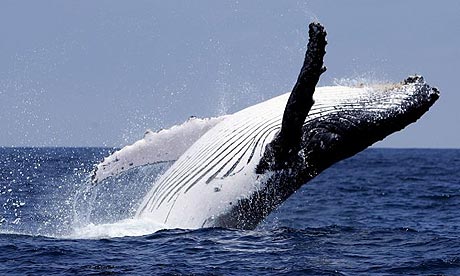1. Study Finds Shark Hotspots Overlap with Commercial Fishing Locations
A study published in the journal Proceedings of the National Academy of Sciences revealed that sharks are at risk of being overfished by commercial fishing vessels in in the North Atlantic. During a four-year period from 2005 to 2009, researchers from University of Miami (UM) Rosenstiel School of Marine and Atmospheric Science and UM Abess Center for Ecosystem Science and Policy tracked more than 100 sharks from six different species in the North Atlantic while concurrently tracking 186 shipping vessels. Both the ships and the sharks followed the ocean fronts characterized by warm water temperature and high productivity. Both the blue and mako sharks, two of the most heavily fished species, were tracked in this study. Blue sharks were estimated to be vulnerable to potential capture 20 days per month, while the mako sharks' potential risk was 12 days per month. Every year, tens of million of ocean-dwelling sharks are caught by commercial fishing operations each year. This research proposes that, in order to conserve the shark species, measures such as catch quotas or size limits will be necessary. Read more...
-----------------------------------------------
2. Hawaii Humpback Whale Sanctuary Won't Be Expanded
This week, the National Oceanic and Atmospheric Administration withdrew its proposal to expand the size and focus of the Hawaiian Islands Humpback National marine Sanctuary. The six year planning developed designs to enlarge the sanctuary from 1,366 square miles to 1,601 square miles in order to expand the number of protected species. The national sanctuary was established in 1992 and is one of the world's most important humpback whale habitats. Opposition to this proposal came from residents concerned that the expanded sanctuary would restrict recreational ocean use and hurt business . Read more...
-----------------------------------------------
3. Video From a Whale Shark's Point of View
-----------------------------------------------
4. Satellites Show Florida Beaches Becoming Darker, and That's Good for Sea Turtles!
-----------------------------------------------
 A paper published in Natural Climate Change, discusses how certain adaptive strategies may have a negative impact on nature which in turn will impact people in the long term. According to CSIRO's principle research scientist Dr. Tara Martin, " in response to climate change, many local communities around the world are rapidly adjusting their livelihood practices to cope with climate change, sometimes with catastrophic implication for nature". The paper states that intact native forests have been shown to reduce the frequency and severity of floods, while coral reefs can reduce wave energy by an average of 97% to provide defense against storm surges. Read more...
A paper published in Natural Climate Change, discusses how certain adaptive strategies may have a negative impact on nature which in turn will impact people in the long term. According to CSIRO's principle research scientist Dr. Tara Martin, " in response to climate change, many local communities around the world are rapidly adjusting their livelihood practices to cope with climate change, sometimes with catastrophic implication for nature". The paper states that intact native forests have been shown to reduce the frequency and severity of floods, while coral reefs can reduce wave energy by an average of 97% to provide defense against storm surges. Read more...
-----------------------------------------------
6. Sperm Whales Taken from Skegness Beach to Landfill

Last weekend, three sperm whales were found washed up on the Lincolnshire coast of England. Scientists took autopsy samples to determine root cause for the death of the whales. The whales were then transported by large construction equipment and buried in a local landfill. Potential cause for these deaths have not been released. Read more...
-----------------------------------------------
Be sure to "LIKE" http://facebook.com/SeaSave to ensure our "Week in Review" is delivered to your newsfeed every Thursday.
Sea Save Foundation is committed to raising awareness of marine conservation. The Week in Review is a team effort produced by the Sea Save staff to provide a weekly summary of the latest in marine research, policy, and news.

